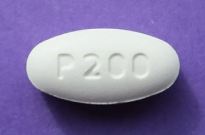AUTHORIZATIONS: ROZLYTREK for cancers with specific genetic defect, PRETOMANID for multidrug resistant TB, TURALIO for tenosynovial giant cell tumor, NUBEQA for castration resistant prostate cancer
ROZYLTREK (entrectinib)
Genentech, Inc.
INDICATION:
- ROS1-Positive Non-Small Cell Lung Cancer : Treatment of adult patients with metastatic non-small cell lung cancer (NSCLC) whose tumors are ROS1-positive.
- NTRK Gene Fusion-Positive Solid Tumors: Treatment of adult and pediatric patients 12 years of age and older with solid tumors that:
- have a neurotrophic tyrosine receptor kinase (NTRK) gene fusion without a known acquired resistance mutation
- are metastatic or where surgical resection is likely to result in severe morbidity, and
- have either progressed following treatment or have no satisfactory alternative therapy.
Approved under accelerated approval based on tumor response rate and durability of response. Continued approval for this indication may be contingent upon verification and description of clinical benefit in the confirmatory trials.
ADDRESSING UNMET NEED:
- “Tissue agnostic” cancer treatment based on a common biomarker across different types of tumors rather than body location
- Innovation in precision oncology drug development, targeted and effective treatments
- Simultaneous approvals in adult and pediatric populations
MECHANISM OF ACTION: Inhibitor of the tropomyosin receptor tyrosine kinases (TRK), proto-oncogene tyrosine-protein kinase ROS1, naplastic lymphoma kinase (ALK), JAK2 and TNK2. Inhibits tumorigenic potential through deactivation of downstream signaling pathways leading to constrained cell proliferation
EFFICACY:
- Four clinical trials studying, n= 54 with NTRK fusion-positive tumors
- Overall Response Rate (tumor shrinkage) of 57%; 7.4% having complete disappearance of the tumor; 61% with tumor shrinkage persisting for nine months or longer.
- Most common cancer locations: Lung, salivary gland, breast, thyroid, colon/rectum
For non-small cell lung cancer, with ROS1-positive and metastatic
- Clinical studies, n= 51 with ROS1-positive lung cancer
- Overall response rate: 78%, 5.9% with complete disappearance of cancer, 55% had tumor shrinkage persist for 12 months or longer
SAFETY:
- Most serious side effects: Congestive heart failure, central nervous system effects, skeletal fractures, hepatotoxicity, hyperuricemia, QT prolongation, vision disorders
- Common side effects: Fatigue, constipation, dysgeusia, edema , dizziness, diarrhea, nausea, dysesthesia, dyspnea, myalgia, cognitive impairment, weight gain, cough, vomiting, fever, arthralgia, vision disorders
REGULATORY PATHWAY: NDA
- Accelerated approval. .Priority Review, Breakthrough Therapy and Orphan Drug designation
- Postmarketing requirements: Clinical studies that further characterize clinical benefit, functional activation or inhibition of off-target receptors, transporters, and/or channels, integrated safety analyses and supporting data, effect of moderate and severe hepatic impairment
 PRETOMANID Tablets
PRETOMANID Tablets
The Global Alliance for TB Drug Development (TB Alliance)
INDICATION: Limited Population: Part of a combination regimen with bedaquiline and linezolid for the treatment of adults with pulmonary extensively drug resistant (XDR) or treatment-intolerant or nonresponsive multidrug-resistant (MDR) tuberculosis (TB). Approval of this indication is based on limited clinical safety and efficacy data.
Indicated for use in limited and specific population of patients
ADDRESSING UNMET NEED:
- Multidrug-resistant TB and extensively drug-resistant TB are public health threats due to limited treatment options
- estimated 490,000 new cases of multidrug-resistant TB worldwide, with a smaller portion of cases of extensively drug-resistant TB
- New treatments are important to meet patient national and global health needs
MECHANISM OF ACTION: Nitroimidazooxazine antimycobacterial drug
EFFICACY:
- Open-label study conducted in three centers in South Africa, n=109 with extensively drug-resistant, treatment intolerant or non-responsive multidrug-resistant pulmonary TB (of the lungs), taken orally in combination with bedaquiline and linezolid, 6 months
- Endpoint: Incidence of bacteriologic failure (reinfection – culture conversion to positive status with different M. tuberculosis strain), bacteriological relapse (culture conversion to positive status with same M. tuberculosis strain), or clinical failure through follow-up until 6 months after the end of treatment
- Successes (lack of failure) : 89%, significantly exceeded the historical success rates or treatment of extensively drug resistant TB
SAFETY:
- Most common adverse reactions: Peripheral neuropathy, acne, anemia, nausea, vomiting, headache, increased liver enzymes, dyspepsia, rash, increased pancreatic enzymes, hypoglycemia, diarrhea
REGULATORY PATHWAY:
- Limited Population Pathway for Antibacterial and Antifungal Drugs (LPAD)pathway
- Qualified Infectious Disease Product (QIDP) designation, Priority Review, Orphan Drug designation
- Awarded Tropical Disease Priority Review Voucher
 TURALIO (pexidartinib) capsules
TURALIO (pexidartinib) capsules
Daiichi Sankyo
INDICATION: Treatment of adult patients with symptomatic tenosynovial giant cell tumor (TGCT) associated with severe morbidity or functional limitations and not amenable to improvement with surgery
ADDRESSING UNMET NEED: TGCT is a rare tumor that affects the synovium and tendon sheaths causing damage to surrounding tissue
MECHANISM OF ACTION: Tyrosine kinase inhibitor that targets colony stimulating factor 1 receptor (CSF1R); inhibition of proliferation of cell lines dependent on CSF1R and ligand-induced autophosphorylation of CSF1R
EFFICACY:
- Multi-center international clinical trial, n=120 patients, TURALIO vs. placebo
- Primary efficacy endpoint: Overall response rate (ORR) analyzed after 25 weeks
- Statistically significant improvement in ORR: 38% on TURALIO vs 0% on placebo
- Complete response rate: 15%, Partial response rate: 23%
SAFETY:
- Boxed Warning: Risk of serious and potentially fatal liver injury. REMS program
- Common side effects: Increased lactate dehydrogenase, increased aspartate aminotransferas, loss of hair color, increased alanine aminotransferase, increased cholesterol
REGULATORY PATHWAY: NDA
- Breakthrough Therapy designation, Priority Review designation, Orphan Drug designation
- Postapproval commitments: Further evaluate the risk of hepatoxicity
- REMS to prevent potentially fatal liver toxicity: To include (i) Communication Plan and (ii) Elements to Assure Safe Use
 NUBEQA (darolutamide) tablets
NUBEQA (darolutamide) tablets
Bayer
INDICATION: Treatment of patients with non-metastatic castration resistant prostate cancer (nmCRPC)
MECHANISM OF ACTION: Androgen receptor (AR) inhibitor
EFFICACY:
- Multicenter, double-blind, placebo-controlled clinical trial, n=1,509 patients with non-metastatic castration resistant prostate cancer, NUBEQA vs. placebo, all received gonadotropin-releasing hormone (GnRH) analog concurrently or had previous bilateral orchiectomy
- Primary endpoint: Metastasis free survival (MFS)
- 40.4 months with darolutamide vs. 18.4 months with placebo, p<0.0001
SAFETY:
- Most common adverse reactions: Fatigue, pain in extremity, and rash
- Other: Ischemic heart disease, failure, seizures
REGULATORY PATHWAY: NDA
- Fast track designation, Priority Review
Image credits: Genentech, TB Alliance, Daiichi Sankyo, Bayer
